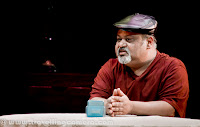'King of the Dark Chamber' on 8th Jan 2012 at Kamani || 14th Bharat Rang Mahotsav organized by National School of Drama, Delhi, India
King of the Dark Chamber is a symbolic play. It is not divided into acts and scenes. It reflects Tagore's philosophy and the relationship between an individual and the universe. In the play, King Symbolizes God and the Dark Chamber, where he resides, represents inner-self of man. Let's check out this quick Photo Journey from this play on Inaugural Day of Bharat Rang Mahotsav...
As a first scene Queen Sudarshana cries for light.
Invisible king says she should identify him when he appears in the festival Basanta Purnima.
Surangama tries to pacify the queen and says that she has witnessed the king only in the dark atmosphere and it is not possible to describe the beauty of the king. But she is happy enough to serve him.
The King can only be accessed in a dark chamber, which means that God can't be found outside, one has to search within.
Second scene is from Basanta Purnima, when thousands of people enjoying the full moon night and the Utsav is in full swing. The evening is intoxicating but the king's absence is marked and disucssed by many people. But the old man Epu says that the king is everywhere.
King Kanchi, Abanti, Koshal etc are in search of the king. They capture Nighthousaba and force him to follow their order. They ask him to lead to the Royal garden and wait for an opportunity to see the beautiful queen.
In this production of play, the performance begins in the Dark Chamber, with Queen crying for light. From here it goes through an entire narrative that finally ends with the reunion of the invisible King and Queen. The Queen is asking for normal external light. And the King is eager to show the internal light which carries both beauty and truth, and thus, constantly tries to lay the foundation for an intense approach.
This play is directed by Ratan Thiyam - Steeped in the musical, narrative, dance and martial arts traditions of Manipur, he trained at National School of Drama (1971-74) before starting on a rich course of experiments with his own Chorus Repertory. He is a writer, director, designer, musician, painter and actor and is recognized as one of the most important theatre makers on the international scene.
Ratan Thiyam has directed more that 60 plays, original scripts as well as adaptations. Under his artistic bato, the company has travelled extensively throughout the world and performed at several major national and international festivals. Mr. Thiyam was Director of NSD from 1971-76. He is also the recipient of several awards and felicitations including the Sangeet Natak Kala akademi Award, Kalidas Samman, John D Rockefeller Award, Fringe First Award, Critics Forum Award and Many more...
Mr. Ratan Thiyam is also honoured with Padamshri, India's highest civilian honour in n1989.
This play was selected for inaugural ceremony of Bharat Rang Mahotsav. Sharmila Tagore was also there to witness the performance of this play which is originally written by Rabindarnath Tagore.
Queen Sudarshana enjoying the romatic atmosphere of Basanta Purnima in her palace garden. And from a far distance wrongly identifies the Ningthousaba as the real king. Queen is totally moved and charmed and ask her maid Rohini to present flowers to the king.
This play was presented by Chorus Repretory Theatre, Imphal, Manipur. This group was established in 1976 under guidance of Ratan Thiyam. This group's 1984 production CHAKRAVYUHA has been performed more than hundred times around the globe.
Cast of this play includes -
Ningthou by Ibamcha Sarak
Sudarsana by Indira
Surangama by Sachi
Kanchi Ningthou by Soma
Rohini by Reena
Ningthousaba by Premjit
Abanti Ningthou by Premananda
Koshal by Ibosana
Kanyakubja by Robindro
Paomi by Premnanda
Angamba by Rocky
Epu by R.K.bhogen
Naha by Olinkumar
...
Ratan Thiyam says that - 'The work is an attempt to give a concise and precise portrayal of original text and more concentration is being given to express the thematic content of the play. Hence the performance text is treated with structural changes according to the complex demand of thematic content. Tagore's depiction of darkness in this play is darkness of innerself and the human mind, which most of the time is materialistic by nature, full of unlimited desire and bears a lack of spiritual depth'
Whole set was beautifully designed and transition between the scenes was awesome.
Did I mention about the language of this play or not. It was in Manipuri and total duration was 1.5 Hrs. Keep watching same place for next Photo Journey from 'Grotowski - An Attmpt to Retreat, by CHOREA Theatre Association, Lodz, Poland'
YOU MAY ALSO WANT TO CHECK -
YOU MAY ALSO WANT TO CHECK -














.jpg)